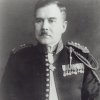Zoran Mojsilov was born in Belgrade, Yugoslavia in 1955. As a small child, he carved his own toys out of scrap wood and was adept at drawing and painting. In early adolescence he began Greco-Roman wrestling and continued this practice into his mid-20’s. He credits the discipline of training, an understanding of the skeletal muscular forms in the human body, and the spirit of competition in sports and life as primary factors for creating art today.
Mojsilov left Belgrade in 1983 for Paris, France to test his artistic credibility. In 1984, he met Ilene Krug, an American Artist, at Association Confluences. After two productive years there, they decided to move to Minneapolis in 1986.
.Once in Minneapolis, Mojsilov made large scale sculptures in wood using the assemblage process that he had started in Paris. His career developed steadily with recognition from local and national grants such as the McKnight Artist Fellowship in 1987, the Socrates Sculpture Park / Athena Foundation Award in 1988 and 1990, the Pollack-Krasner Foundation Artist Fellowship in 1990, the Minnesota State Arts Board Artist Assistance Fellowship in 1994, the Bush Foundation Artist Fellowship in 1996, and the Jerome Foundation, Travel and Study Grant in 1993 and 2001.
Mojsilov had a sculptural break-through in 1990 when he was an artist-in-residence at La Vie des Formes in Chalon-sur-Saône, France. In this French shipyard, he took up welding and made sculptures in stone and steel. Mojsilov continues to use these durable materials in his public art projects to this day. They include: the Metropolitan Regional Arts Council High Bridge Park, St. Paul in 1995, the Minneapolis Arts Commission, Camden Gateway Project, Minneapolis in 1996, the Minnesota Percent for Art in Public Places, Rochester Community & Technical College in 1997; the Dallas Area Rapid Transit, Dallas TX in 1998; Wisconsin Percent for Art in Public Places, U of WI at Stevens Point WI in 1999; Kirchbak Sculpture Garden, Richfield MN in 2000; North Dakota Museum of Art, Grand Forks ND in 2000; Spirit of Milwaukee Neighborhood Millennium Art Initiative, Milwaukee WI in 2000; Nebraska Percent for Art in Public Places at Wayne State College in Wayne NE in 2002; the Anderson Center for Interdisciplinary Studies in Red Wing MN in 2006.
From: Bockley Gallery





